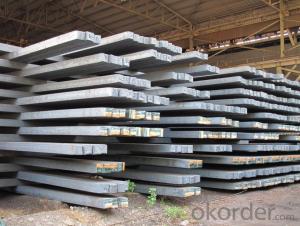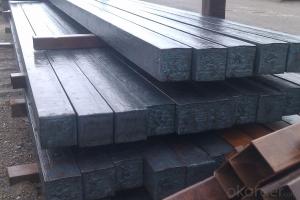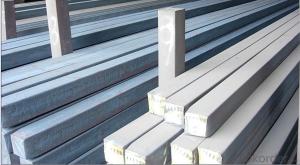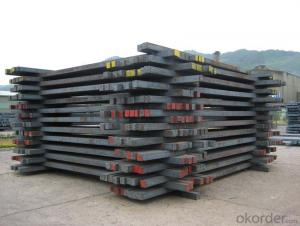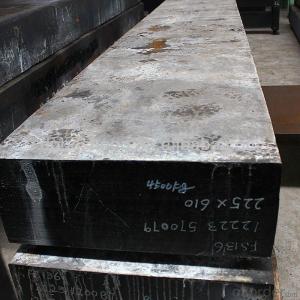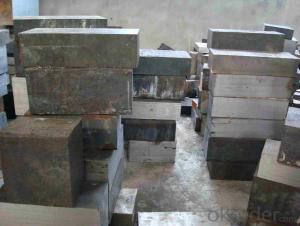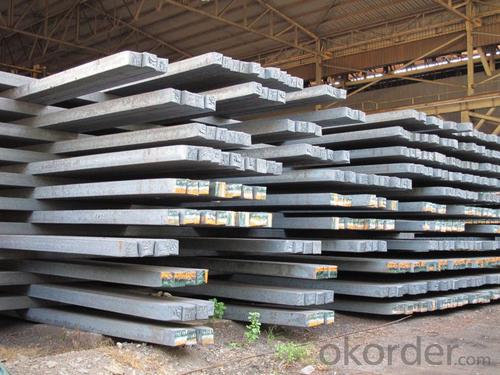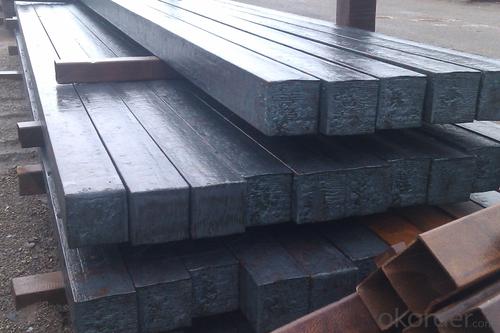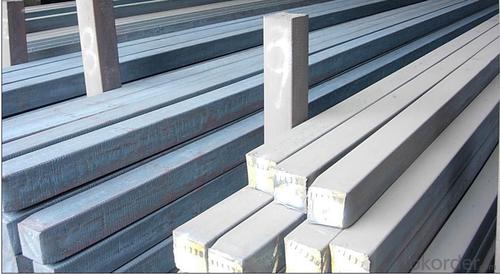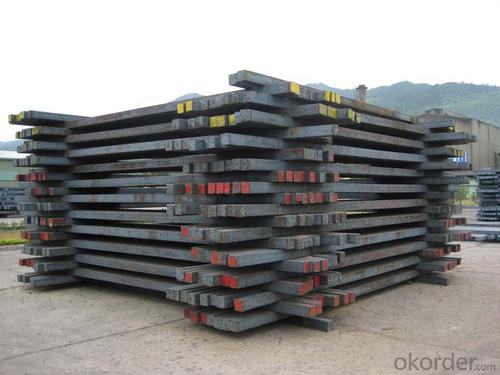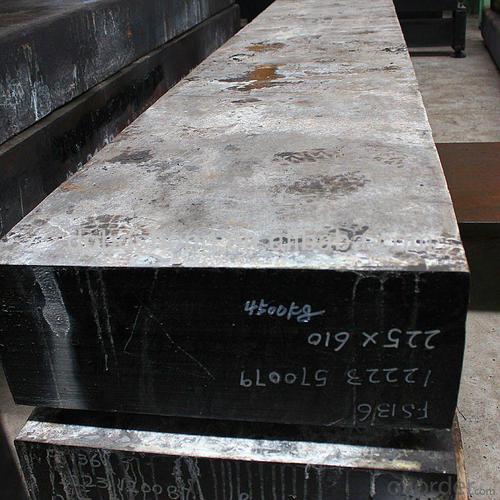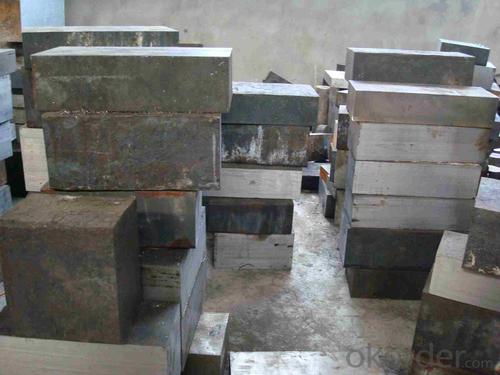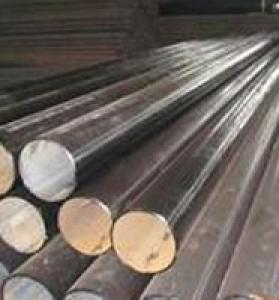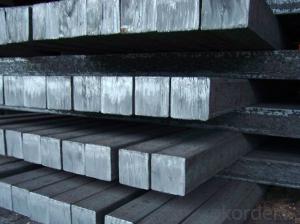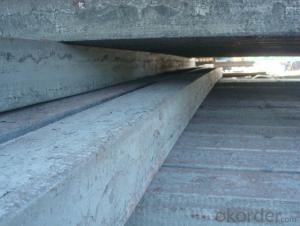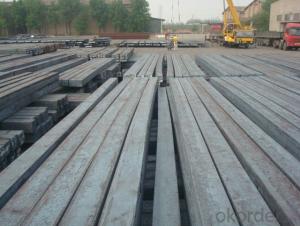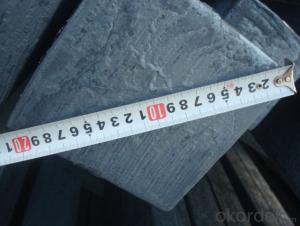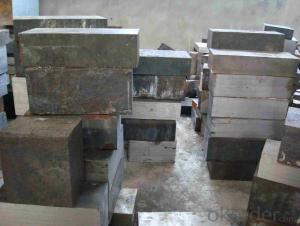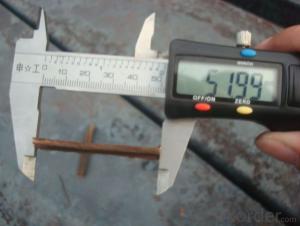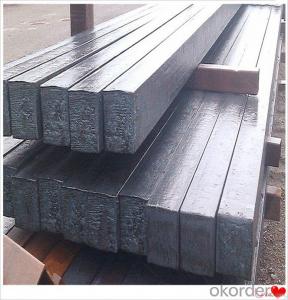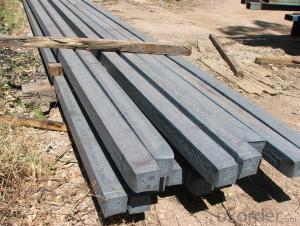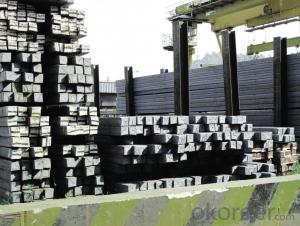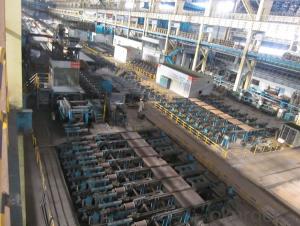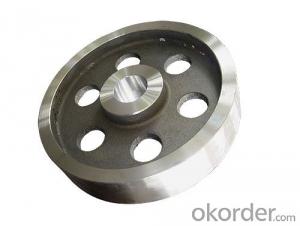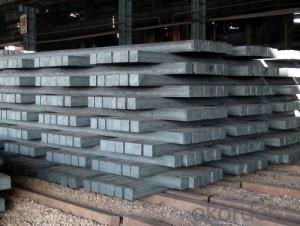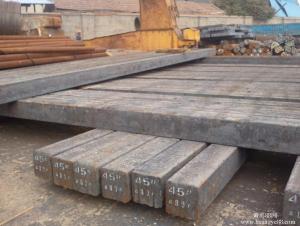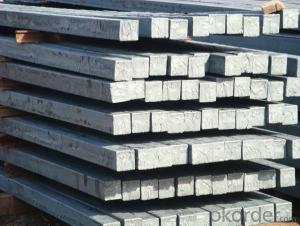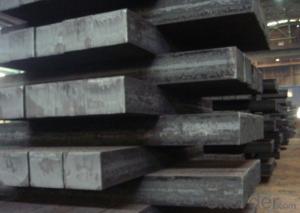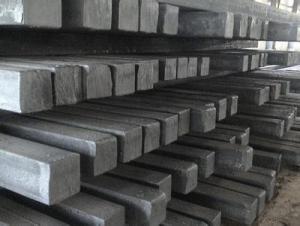Prime Q275 125mm Square Alloy Steel Billet
- Loading Port:
- Shanghai
- Payment Terms:
- TT OR LC
- Min Order Qty:
- 100 m.t.
- Supply Capability:
- 10000 m.t./month
OKorder Service Pledge
OKorder Financial Service
You Might Also Like
Structure of Prime Q275 125mm Square Alloy Steel Billet
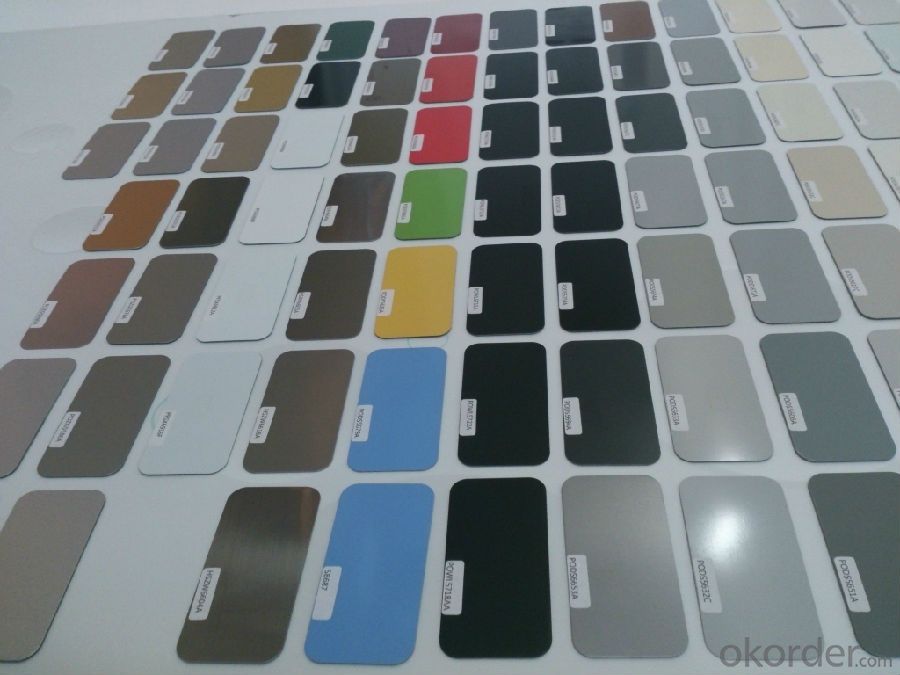
Description of Prime Q275 125mm Square Alloy Steel Billet
1. Prepainted steel coil is coated with organic layer, which provides higher anti-corrosion property and a longer lifespan than that of galvanized or galvalume steel sheets.
2. The base metals for prepainted steel coil consist of cold rolled, HDGI Steel, electro-galvanized and hot-dip alu-zinc coated steel. The finish coats of prepainted steel coil can be classified into groups as follows: polyester, silicon modified polyesters, polyvinylidene fluoride, high-durability polyester, etc.
3. The production process has evolved from one-coating-and-one-baking to double-coating-and-double-baking, and even three-coating-and-three-baking.
4. The color of the prepainted steel coil has a very wide selection, like orange, cream-colored, dark sky blue, sea blue, bright red, brick red, ivory white, porcelain blue, etc.
5. The prepainted steel coils can also be classified into groups by their surface textures, namely regular prepainted sheets, embossed sheets and printed sheets.
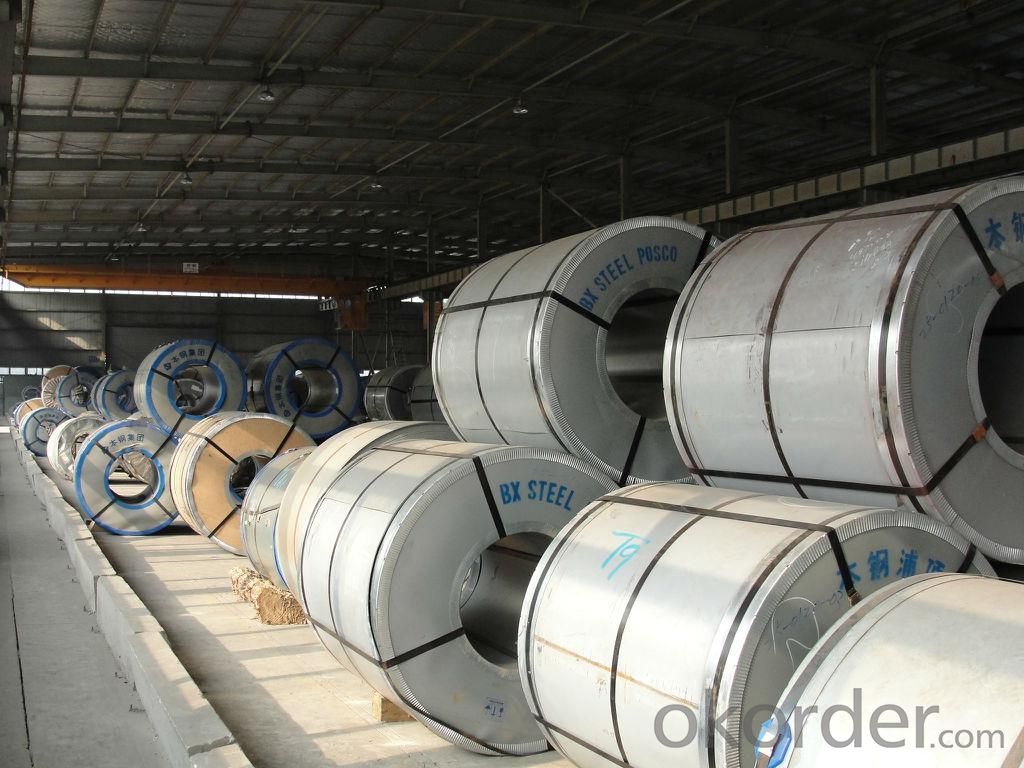
Main Feature of Prime Q275 125mm Square Alloy Steel Billet
Uncoated CR steel sheet
With the features of in line with the international highest standards in demension and shape, excellent surface finish and properties, the products are mainly used in home appliance and automobile industries.
Galvanized steel sheet(include HDG and EG)
With the features of good corrosion resistance, the products are mainly used in automobile, home appliance, electronics, building and machinery manufacture industries, etc.
Precoated steel sheet
With the features of enviromental protection and good processablility, long lasting surface durability, rich in colors, the products are maily used in building, home appliance and furniture industries, etc.
Applications of Prime Q275 125mm Square Alloy Steel Billet
A. Corrugated design makes it excellent waterproof performance
B. Materials as prepainted steel sheets, galvanized steel sheets, galvalume (Al-Zn coated sheets) are available to make corrugated sheet.
C.Those material are durable, anti-corrosion in bad weather for 20-30 years based on it's Zinc(Galvanized) coating or AZ (Galvalume) coating.
D. Different shape of the sheet make it suitable for any style of buildings.
E.Easy to install, no need special tools to fix the sheet.
F.Light weight due to high strength to weight ratio of steel. Light weight means easier handling lower shipping costs, easier installation
G. Different color is availbe base on the RAL Standard make your building more beautiful.
H. We will provide the best solutions if you don't have a exact idea of the specification you want for the steel sheet based on your weather conditions, engineering structure, construction budget and so on.
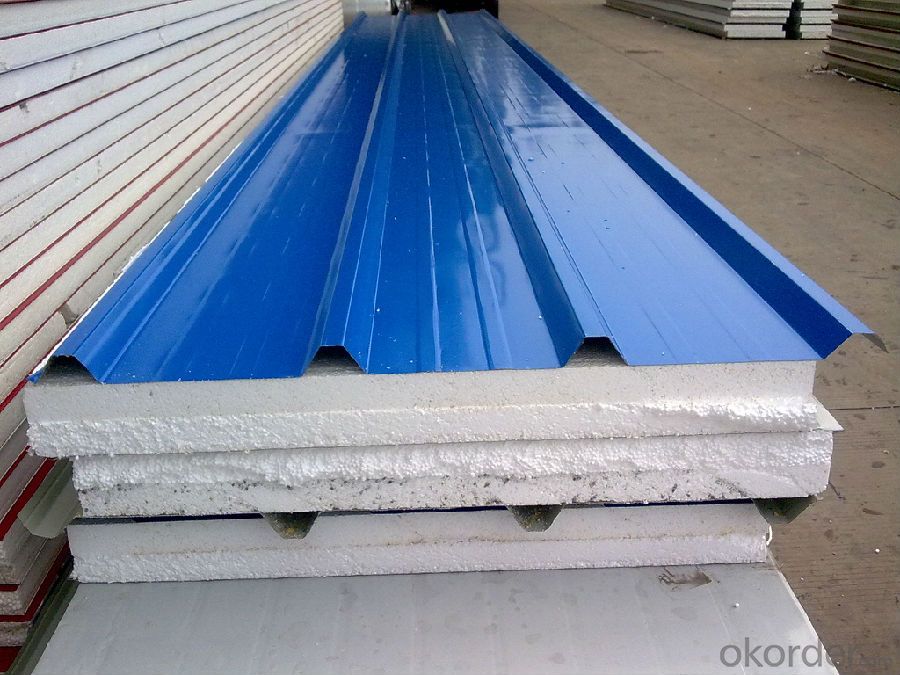
Specifications of Prime Q275 125mm Square Alloy Steel Billet
Product | Billet |
Material Grade | SGCC / SGCH / DX51D+AZ, etc |
Thickness | 0.6-3.0mm |
Width | 500-1500mm |
Tolerance | Thickness: +/-0.02mm , Width:+/-2mm |
Zinc-coating | Z30-150g/m2 |
Technique | Raw material: Hot rolled steel coil --> Cold rolled_>hot dipped galvalume |
Surface | Dried, Chromated, Unoiled |
Spangle | Regular spangle , small spangle, zero spangle |
ID | 508MM 610MM |
Coil weight | 1-25MT |
Export package | Cardboard inner sleeves, Waterproof paper, galvanized steel covered and steel strip packed |
FAQ of Prime Q275 125mm Square Alloy Steel Billet
We have organized several common questions for our clients,may help you sincerely:
1. How Can I Visit There?
Our company is located in Tianjin City, China, near Beijing. You can fly to Tianjin Airport Directly. All our clients, from home or aboard, are warmly welcome to visit us!
2. How Can I Get Some Sample?
We are honored to offer you sample.
3. Why choose CNBM?
Our delivery time about 15-20days for standard sizes, if you have other requirements like hardness, quanity and width ,it is about 20-40days. But don't worry we also try our best for the delivery time ,because time longer and our cost is higher.
- Q: What are the safety precautions to be taken while handling steel billets?
- To ensure the well-being of individuals and maintain the integrity of the material, it is important to adhere to several safety precautions when dealing with steel billets. Some key safety measures include: 1. Personal Protective Equipment (PPE): It is crucial to wear the appropriate PPE, such as gloves, safety glasses, and steel-toed boots, to protect against potential injuries. Steel billets are heavy and mishandling them can lead to severe harm. 2. Proper Lifting Techniques: When lifting steel billets, it is essential to use correct lifting techniques, such as bending at the knees and maintaining a straight back. This helps prevent strains, sprains, and other musculoskeletal injuries. 3. Adequate Training: Workers must receive proper training on the safe handling of steel billets. This includes understanding the weight and dimensions of the billets, knowing how to move them safely, and being aware of potential hazards. 4. Secure Storage and Transportation: To prevent accidents, steel billets should be stored and transported securely. They should be stacked properly, secured, and not overloaded to prevent falling or shifting during handling. 5. Clear Communication: Clear communication is crucial in a work environment where multiple individuals are involved in handling steel billets. This involves using appropriate signals and verbal communication to coordinate movements and ensure everyone's safety. 6. Equipment Inspection: Before handling steel billets, it is important to inspect the equipment being used, such as cranes, forklifts, or other lifting devices. This helps identify any potential issues or malfunctions that could compromise safety. 7. Regular Maintenance: Regular maintenance of equipment used for handling steel billets is vital to ensure their proper functioning. This includes inspections, repairs, and replacements as necessary. 8. Hazard Identification: Workers should be trained to identify potential hazards associated with handling steel billets, such as sharp edges, hot surfaces, or slippery floors. Promptly addressing these hazards can prevent accidents and injuries. 9. Ergonomic Considerations: When designing workstations and handling procedures, ergonomic factors should be taken into account. This includes ensuring proper height and reach distances, providing adequate space for movement, and using tools or equipment that reduce strain on the body. 10. Emergency Response: Lastly, workers should be familiar with emergency response procedures in case of accidents or injuries. This includes knowing the location of first aid kits, fire extinguishers, emergency exits, and how to report incidents to supervisors. By adhering to these safety precautions, individuals can mitigate the risks associated with handling steel billets and create a safer work environment.
- Q: What are the different types of surface finish defects found in steel billets?
- Steel billets can contain various types of surface finish defects, which can arise from the manufacturing process or from handling and transportation. Common defects include scale, pitting, scratches, roll marks, lamination, decarburization, and surface irregularities. Scale refers to the rough, flaky oxide layer that forms on the billet surface during heating and rolling. It can be removed through different surface cleaning methods. Pitting is the formation of small depressions or craters on the billet surface, caused by factors like corrosion, improper handling, or contamination during processing. Pitting weakens the steel and compromises its integrity. Scratches are visible marks or lines on the billet surface, occurring during handling, transportation, or processing. They can be superficial or deep, with deep scratches potentially requiring further inspection or treatment. Roll marks are impressions or patterns left on the billet surface by the rolling process. They result from improper alignment or wear and tear of the rolling equipment. While they affect the billet's aesthetic appearance, they generally don't impact its structural integrity. Lamination refers to the separation of layers or flakes within the billet, caused by inadequate bonding during manufacturing or excessive rolling. Lamination weakens the steel and compromises its performance. Decarburization is the loss of carbon from the billet surface due to exposure to high temperatures or oxidizing environments. It reduces the steel's hardness and strength. Surface irregularities encompass any distortion or unevenness on the billet surface, such as dents, bulges, or uneven textures. They can be caused by factors like improper handling, machining, or defects in the manufacturing process. It's worth noting that the severity and impact of these surface finish defects can vary. Some defects may have minimal effect on the steel's performance and be purely cosmetic, while others may necessitate further inspection or treatment to ensure the billet's structural integrity.
- Q: What is the typical surface finish of a steel billet?
- Depending on the specific application and processing method, the surface finish of a steel billet can vary. Generally, steel billets are produced with a rough surface finish that may have imperfections like scale, oxide layers, or minor irregularities. This is primarily because of the manufacturing process involving hot rolling or casting. Hot rolling is a common method for producing steel billets. In this process, the steel is heated to high temperatures and shaped by passing it through rollers. This high-temperature process can result in the formation of scale or oxide layers on the billet's surface, making it appear rough and textured. Similarly, steel billets produced through casting methods like continuous casting or ingot casting may also have a rough surface finish. During these processes, the molten steel solidifies in molds, leading to surface imperfections like cracks, pits, or unevenness. However, it's important to note that the surface finish of steel billets can be improved through additional processes such as descaling, shot blasting, or grinding. These processes help remove scale, oxide layers, or other imperfections, resulting in a smoother and more uniform surface finish. Furthermore, steel billets intended for specific applications like precision machining or forging may undergo additional surface treatments like polishing or coating to achieve the desired finish. In conclusion, the typical surface finish of a steel billet is rough and may have scale, oxide layers, or minor irregularities. However, various additional processes can be used to improve the surface finish according to specific requirements and applications.
- Q: How are steel billets used in the production of axles?
- Steel billets are used in the production of axles as a starting material. They are heated and shaped through forging or rolling processes to form the desired axle shape. This ensures the axle has the necessary strength and durability to support the weight and withstand the forces experienced during operation.
- Q: What are the main safety precautions in handling steel billets?
- The main safety precautions in handling steel billets include wearing appropriate personal protective equipment (PPE) such as gloves, safety glasses, and steel-toed boots to protect against potential injuries. It is important to use proper lifting techniques and equipment to prevent strains and back injuries. Additionally, ensuring a clean and organized work area helps to reduce the risk of slips, trips, and falls. Regular inspection and maintenance of equipment, as well as proper training and supervision, are crucial to maintaining a safe working environment when handling steel billets.
- Q: What is the melting point of steel billets?
- The melting point of steel billets may vary depending on the type of steel utilized. In general, the melting point of steel falls within the range of 1370 to 1530 degrees Celsius (2500 to 2800 degrees Fahrenheit). However, it is worth noting that diverse grades and compositions of steel can possess slightly different melting points. Moreover, factors such as impurities, alloying elements, and the inclusion of other metals in the steel can also influence the melting point. Consequently, it is always advisable to refer to the specific material specifications or seek guidance from metallurgical experts to obtain precise information regarding the melting point of steel billets.
- Q: How are steel billets used in the production of building facades?
- Due to their versatility and strength, steel billets are a vital component in the manufacturing of building facades. Building facades, which serve as both an aesthetic feature and a protective barrier against external elements, rely on steel billets for various purposes. To begin with, steel billets, which are semi-finished steel products, are commonly used as the primary material for the structural framework of facades. Their high strength-to-weight ratio makes them an ideal choice for supporting the weight of the facade and ensuring structural stability for the building. Furthermore, steel billets can be further processed to create different shapes and profiles required for facade design. Through processes like hot rolling, cold rolling, or extrusion, architects and designers can shape steel billets into intricate and customized designs. This flexibility allows for the creation of unique and aesthetically pleasing facades that enhance the overall appearance of the building. Steel billets also find application in the production of curtain wall systems, which are commonly used in modern building facades. Acting as non-structural cladding systems, curtain walls are attached to the building's structural framework. Steel billets are frequently utilized in the creation of curtain wall support systems, providing the necessary strength and durability to withstand external pressures such as wind loads and seismic forces. Additionally, steel billets can be coated or treated with various finishes to enhance their corrosion resistance and increase their longevity. From galvanization to powder coating, these finishes ensure that the building facade remains durable and visually appealing over time. In conclusion, steel billets play a critical role in the manufacturing of building facades, offering strength, design flexibility, and durability. Their utilization in the structural framework, creation of customized shapes, support systems for curtain walls, and application of protective finishes make them an indispensable material in the construction industry.
- Q: What are the main differences between carbon steel and alloy steel billets?
- Carbon steel and alloy steel billets are both types of steel used in various industries, but they have some key differences. The main difference between carbon steel and alloy steel billets lies in their composition. Carbon steel billets are primarily made up of iron and carbon, with carbon content usually ranging from 0.05% to 2.1%. This makes carbon steel relatively more affordable and easier to produce compared to alloy steel. On the other hand, alloy steel billets contain additional elements like manganese, nickel, chromium, and molybdenum, which are added to enhance specific properties of the steel. These alloying elements give alloy steel superior strength, hardness, and resistance to corrosion compared to carbon steel. Another major difference between carbon steel and alloy steel billets is their mechanical properties. Carbon steel billets are generally known for their high ductility and ability to be easily shaped or formed, making them suitable for applications that require flexibility and easy machinability. Alloy steel billets, on the other hand, have higher tensile strength, toughness, and wear resistance due to the presence of alloying elements. This makes alloy steel billets ideal for applications that require high strength and resistance to wear, such as in construction, automotive, and aerospace industries. Furthermore, the heat treatment process for carbon steel and alloy steel billets also differs. Carbon steel billets are often heat-treated to improve their hardness and strength, with common treatments including quenching and tempering. Alloy steel billets, on the other hand, can undergo a wider range of heat treatment processes, including annealing, normalizing, and precipitation hardening. These heat treatments help to optimize the properties of alloy steel billets for specific applications, such as increasing strength or improving machinability. In summary, the main differences between carbon steel and alloy steel billets lie in their composition, mechanical properties, and heat treatment processes. Carbon steel is primarily made up of iron and carbon, while alloy steel contains additional alloying elements. Carbon steel has high ductility and is easily shaped, while alloy steel has superior strength, hardness, and resistance to corrosion. The heat treatment processes for these two types of steel also differ, with alloy steel having a wider range of treatment options.
- Q: What are the different types of steel billet casting defects?
- There are several types of steel billet casting defects, including surface defects like cracks, laps, and scabs, as well as internal defects such as shrinkage cavities, porosity, and inclusions.
- Q: How are steel billets used in the production of aerospace parts?
- Steel billets are used in the production of aerospace parts as they serve as the starting material for forging or machining processes. These billets are heated, shaped, and then further processed to create the desired components, such as engine parts, landing gear components, or structural elements, which are crucial for the performance and safety of aerospace machinery.
Send your message to us
Prime Q275 125mm Square Alloy Steel Billet
- Loading Port:
- Shanghai
- Payment Terms:
- TT OR LC
- Min Order Qty:
- 100 m.t.
- Supply Capability:
- 10000 m.t./month
OKorder Service Pledge
OKorder Financial Service
Similar products
Hot products
Hot Searches
Related keywords
